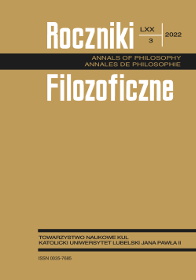Compasses, Maps, and Old Wineskins: Some Remarks on the Metaphor in the Scientific Narrative
Abstract
The article is an invitation to rethink a new and not necessarily original question — the role of metaphor in scientific writing. The immediate pretext is the metaphor of the compass, map, and training, and, in another plan, “old wineskins into which new wine is poured.” These figures are used by Sebastian Gałecki as the culmination of his dissertation Etyka chrześcijańska dla postchrześcijańskiej epoki [Christian Ethics for the Post-Christian Age], confronting the three concepts: ethics of character efficiency (virtue) (Alasdair MacIntyre), conscience (John Henry Newman), and the new theory of natural law (John Finnis). Leaving aside the essence of the content of the dissertation, I try to identify several issues and threats related to the use of metaphors by the authors. In the Umberto Eco terminology, they are regarded as “hot” and methodologically problematic elements of reflection and the way of writing in science. Despite the doubts and reservations about the metaphor as an “unscientific” figure, I would like to defend the right to its correct use in philosophy, especially in ethics. As an example of such use, I consider their use in Sebatian Gałecki’s book.
References
Alquié, Ferdinand. 1989. Kartezjusz. Tłum. Stanisław Cichowicz. Warszawa: Instytut Wydawniczy PAX.
Chmielewski, Adam. 1996. „Filozofia moralności Alasdaira MacIntyre’a”. Przedmowa do: Alisdaire MacIntyre. Dziedzictwo cnoty. Studium z teorii moralności. Tłum. A. Chmielewski, Warszawa; Wydawnictwo Naukowe PWN.
Coehlo, Paulo. 2000. Podręcznik wojownika światła. Tłum. Barbara Stępień. Warszawa: Drzewo Babel.
Descartes, René. 1988. Rozprawa o metodzie. Tłum. Wanda Wojciechowska. Warszawa: Państwowe Wydawnictwo Naukowe [PWN].
Eco, Umberto. 2007. Jak napisać pracę dyplomową. Poradnik dla humanistów. Tłum. Grażyna Jurkowlaniec, Warszawa: Wydawnictwa Uniwersytetu Warszawskiego.
Elzenberg, Henryk. 1922. Marek Aureliusz. Z historii i psychologii etyki. Lwów, Warszawa: Nakładem Księgarni Polskiej im. B. Polonieckiego.
Elzenberg, Henryk. 2020. Kłopot z istnieniem. Aforyzmy w porządku czasu. Toruń: Wydaw-nictwo Naukowe Uniwersytetu Mikołaja Kopernika.
Gałecki, Sebastian. 2020. Etyka chrześcijańska dla postchrześcijańskiej epoki. Kraków: Universitas.
Głąb, Anna. 2016. Literatura a poznanie moralne. Epistemologiczne podstawy etycznej krytyki literackiej. Lublin: Wydawnictwo KUL.
Kot, Dobrosław. 2019. „Niesłychany obcy”. Ethos 32, nr 1 (125): 85-102.
MacIntyre, Alasdair. 1981. After Virtue: A Study in Moral Theory. London: Gerald Duckworth & Co. Ltd.
MacIntyre, Alasdair. 1988. Whose Justice? Which Rationality? London: Gerald Duckworth & Co. Ltd.
MacIntyre, Alasdair. 1990. Three Rival Versions of Moral Enquiry Encyclopaedia, Genealogy, and Tradition, London: Gerald Duckworth & Co. Ltd.
Nietzsche, Friedrich. 1905–1906. Zmierzch bożyszcz. Jak filozofuje się młotem. Przeł. Stanisław Wyrzykowski. Warszawa: W. L. Anczyc.
Pinker, Steven. 2016. Piękny styl. Przewodnik człowieka myślącego po sztuce pisania XXI wieku. Tłum. Agnieszka Nowak-Młynikowska. Sopot: SmakSłowa.
Ratzinger, Joseph. 2021. „Misja biskupa i teologa w obliczu problemów moralności naszych czasów. Wykład podczas warsztatów dla biskupów w Dallas, USA, 6-9 lutego 1984 roku: o pytaniach teologii moralnej”. W: Głosiciele Słowa i słudzy waszej radości. Tłum. Marzena Górecka i Monika Rodkiewicz. Opera omnia, t. XII. Lublin: Wydawnictwo KUL.
Rothenberg, Albert. 1995. „Creative Cognitive Processes in Kekulé’s Discovery of the Structure of the Benzene Molecule”. The American Journal of Psychology 108, no. 3: 419–38, https://doi.org/10.2307/1422898.
Tatarkiewicz, Władysław. 1971. „Trzy etyki. Studium z Arystotelesa”. W: Droga do filozofii i inne rozprawy filozoficzne, t. I, 324–338. Warszawa: Państwowe Wydawnictwo Naukowe [PWN].
Tokarczyk, Roman Andrzej. 2009. Przykazania etyki prawniczej. Księga myśli, norm i rycin. Warszawa: Wolters Kluwer Polska.
Wróblewski, Andrzej Kajetan. 2009. Taniec atomów, „Wiedza i Życie” nr 8 (sierpień): 65.
Zawisławska, Magdalena. 2001. Metafora w języku nauki. Na przykładzie nauk przyrodniczych, Warszawa: Wydawnictwa Wydziału Polonistyki UW.
Zdrenka, Marcin T. 2013. „Trzy przyległości przyjaźni: przytomność – przygodność – przypowieść”. Ethos” 26 nr 3 (103), s. 105–120.
Zdrenka, Marcin. 2016. „Morbus etymologicus? Philosophers in the element of etymologisation”. Kultura i Edukacja. Quarterly no. 2 (112): 128–144. DOI: https://doi.org/10.15804/kie.2016.02.10.
Copyright (c) 2022 Roczniki Filozoficzne

This work is licensed under a Creative Commons Attribution-NonCommercial-NoDerivatives 4.0 International License.





